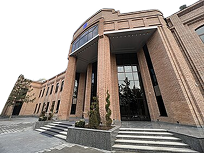Farid Bozorgnia was an Associate Researcher in the Department of Mathematics at Instituto Superior Técnico (IST), Lisbon. He received his PhD in Mathematics from the Royal Institute of Technology (KTH) in Stockholm in 2009, with a dissertation on numerical algorithms for free boundary problems. He also holds a Master’s degree in Applied Mathematics from Polytechnic University in Tehran. His academic experience spans Portugal, Germany, Sweden, Iran, and Brazil, where he has held research and teaching positions at institutions including Örebro University, Persian Gulf University, and the University of Texas at Austin.
Bozorgnia's research lies at the intersection of numerical PDEs, optimization, machine learning, and graph-based models. He has been invited to speak at numerous international conferences and workshops, and has supervised multiple graduate theses in applied mathematics and computational science.
 O'zbekcha
O'zbekcha
 Русский
Русский
 English
English



